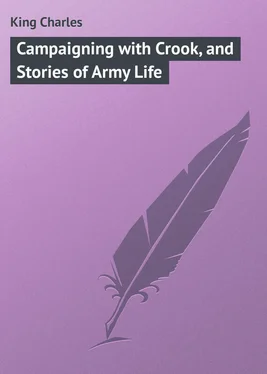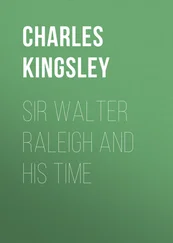Charles King - Campaigning with Crook, and Stories of Army Life
Здесь есть возможность читать онлайн «Charles King - Campaigning with Crook, and Stories of Army Life» — ознакомительный отрывок электронной книги совершенно бесплатно, а после прочтения отрывка купить полную версию. В некоторых случаях можно слушать аудио, скачать через торрент в формате fb2 и присутствует краткое содержание. Жанр: foreign_prose, на английском языке. Описание произведения, (предисловие) а так же отзывы посетителей доступны на портале библиотеки ЛибКат.
- Название:Campaigning with Crook, and Stories of Army Life
- Автор:
- Жанр:
- Год:неизвестен
- ISBN:нет данных
- Рейтинг книги:5 / 5. Голосов: 1
-
Избранное:Добавить в избранное
- Отзывы:
-
Ваша оценка:
- 100
- 1
- 2
- 3
- 4
- 5
Campaigning with Crook, and Stories of Army Life: краткое содержание, описание и аннотация
Предлагаем к чтению аннотацию, описание, краткое содержание или предисловие (зависит от того, что написал сам автор книги «Campaigning with Crook, and Stories of Army Life»). Если вы не нашли необходимую информацию о книге — напишите в комментариях, мы постараемся отыскать её.
Campaigning with Crook, and Stories of Army Life — читать онлайн ознакомительный отрывок
Ниже представлен текст книги, разбитый по страницам. Система сохранения места последней прочитанной страницы, позволяет с удобством читать онлайн бесплатно книгу «Campaigning with Crook, and Stories of Army Life», без необходимости каждый раз заново искать на чём Вы остановились. Поставьте закладку, и сможете в любой момент перейти на страницу, на которой закончили чтение.
Интервал:
Закладка:
Saturday morning, the 5th of August, broke clear and cloudless, and at the very peep of day the hillsides re-echoed to the stirring music of our reveille. Cavalry trumpet, soft and mellow, replied to the deeper tone of the infantry bugle. We of the Fifth tumbled up in prompt and cheery response to the summons. Roll-call was quickly over. The horses took their final grooming with coltish impatience, and devoured their grain in blissful ignorance of the sufferings in store for them. The officers gathered for the last time in two months around their mess-chests and thankfully partook of a bountiful breakfast. Then "the General" rang out from cavalry headquarters; down fell the snowy canvas in every direction; wagon after wagon loaded up in the rapid style acquired only in long campaigning, and trundled off to join the quartermaster's corral. The long column of infantry crawled away northward over the divide; half a dozen mounted scouts and rangers cantered away upon their flanks; the busy packers drove up their herds of braying mules, lashed boxes of hard-tack and sacks of bacon upon the snugly-fitting "apparejo" – the only pack-saddle that ever proved a complete success – and finally everything was ready for the start. The bustling town of yesterday had disappeared, and only long rows of saddles and bridles disposed upon the turf in front of each company indicated the regimental position.
At General Carr's headquarters, among the willows close to the stream, a white flag, with a centre square of red, is fluttering in the breeze. It is one of the signal flags, but as the regimental standard had been left with the band at Fort Hays, the general adopted this for the double purpose of indicating his own position and of conveying messages to the distant outposts. Yesterday afternoon a group of our Indian allies, Crows and Shoshones, surrounded that flag with wondering interest from the moment of its first appearance. Accustomed to the use of signals themselves, they eagerly watch any improvement upon their system, and, learning from Sergeant Center, our standard-bearer and signal sergeant, that this was a "speaking flag," they hung around for hours to observe its operation. The herds of the different companies were browsing on the hillsides half a mile away, strong pickets being thrown out in their front, and each herd guarded by a sergeant and party from its own company. So General Carr, to give the Indians an idea of its use and at the same time secure more room, directed the sergeant to "Flag those Second Battalion herds to the other side of that ravine." So Center signalled "Attention" to the outposts, to which they waved "22, 22, 22, 3," the signal for "All right, go ahead, we're ready," and then, with the staring eyes of a score of swarthy warriors following his every move, Center rapidly swung his flag to form the message: "General Carr directs herds Second Battalion cross ravine." Speedily the grays of Company "B" and the four bay herds of the other companies began the movement, were slowly guided through the sorrels, blacks, and bays of the First Battalion, and commenced the descent into the ravine. One herd lagged a little behind, and the general, gazing at them through his binocular, quickly divined the cause. "Confound that herd guard; tell 'em to take off those side-lines when they're moving, if it's only a hundred yards." The message is sent as given, the side-lines whipped off, the horses step freely to their new grazing-ground, Crow and Shoshonee mutter guttural approbation and say that flag is "heap good medicine."
Hours afterwards they are hunting about camp for old flour-sacks and the like, and several towels, spread on the bushes at the bathing-place below camp to dry in the sun, are missing.
Now, on this brilliant Saturday morning, as we wait expectant of the signal "Boots and saddles," the cavalcade of our fierce allies comes spattering and plunging through the stream. Grim old chieftains, with knees hunched up on their ponies' withers, strapping young bucks bedaubed in yellow paint and red, blanketted and busy squaws scurrying around herding the spare ponies, driving the pack animals, "toting" the young, doing all the work in fact. We have hired these hereditary enemies of the Sioux as our savage auxiliaries, "regardless of expense," and now, as they ride along the line, and our irrepressible Mulligans and Flahertys swarm to the fore intent on losing no opportunity for fun and chaff, and the "big Indians" in the lead come grinning and nodding salutations towards the group of officers at headquarters, a general laugh breaks out, for nearly every warrior has decorated himself with a miniature signal flag. Fluttering at the end of his "coup" stick or stuck in his headgear, a small square of white towelling or flour-sack, with a centre daub of red paint, is displayed to the breeze, and, under his new ensign, Mr. Lo rides complacently along, convinced that he has entered upon his campaign with "good medicine."
Half-past six. Still no signal to bring in the herds. But Merritt, Carr, and Royall are born and bred cavalrymen, and well know the value of every mouthful of the rich dew-laden grass before the march begins. We are exchanging good-byes with the quartermasters and the unhappy creatures who are to remain behind, adding our closing messages to the letters we leave for dear ones in distant homes, when the cheery notes ring out from brigade headquarters and are taken up, repeated along the line by the regimental trumpeters. Far out on the slopes our horses answer with eager hoof and neigh; with springy steps the men hasten out to bridle their steeds, and, vaulting on their backs, ride in by companies to the line. The bustle of saddling, the snap of buckle and whip of cinch, succeeds, then "Lead into line" is heard from the sergeant's lips. Officers ride slowly along their commands, carefully scrutinizing each horse and man. Blanket, poncho, overcoat, side-line, lariat, and picket-pin, canteen and haversack, each has its appropriate place and must be in no other. Each trooper in turn displays his "thimble belt" and extra pocket package, to show that he has the prescribed one hundred rounds. The adjutant, riding along the line, receives the report of each captain and transfers it to his note-book. Away down the valley we see the Second and Third already in motion, filing off around the bluffs. Then General Carr's chief trumpeter raises his clarion to his lips. "Mount," rings out upon the air, and with the sound twenty officers and five hundred and fifteen men swing into saddle. Ten minutes more and we are winding across the divide towards Prairie Dog Creek on the east. The Third and Second, a mile to our left, are marching northeastward on the trail of the infantry. We fill our lungs with deep draughts of the rare, bracing mountain breeze, take a last glance at the grand crags and buttresses of rock to the southward, then with faces eagerly set towards the rolling smoke-wreaths that mark the track of the savage foe in the valley of the "Deje Agie," we close our columns, shake free our bridle reins, and press steadily forward. "Our wild campaign has begun."
CHAPTER VI.
THE MEET ON THE ROSEBUD
That General Crook's command, now designated as the "Big Horn and Yellowstone Expedition," started upon its campaign in the best possible spirits and under favoring skies, no one who saw us that bright August morning could have doubted. Unhappily, there was no one to see, no one to cheer or applaud, and, once having cut loose from our wagons and their guards, there was not a soul to mark our progress, unless it were some lurking scout in distant lair, who trusted to his intimate knowledge of the country and to his pony's fleetness to keep himself out of our clutches. Once fairly in the valley of the Prairie Dog, we had a good look at our array. The Fifth Cavalry in long column were bringing up the rear on this our first day's march from Goose Creek; our packers and their lively little mules jogging briskly along upon our right flank, while the space between us and the rolling foot-hills on the left was thickly covered with our Crow allies. The Shoshones were ahead somewhere, and we proceeded to scrape acquaintance with these wild warriors of the far northwest, whom we were now meeting for the first time. Organized in 1855, our regiment had seen its first Indian service on the broad plains of Texas, and was thoroughly well known among the Comanches, Kiowas, and Lipans when the great war of the rebellion broke out. In those days, with Sidney Johnston, Robert E. Lee, Earl Van Dorn, Kirby Smith, Fitz Hugh Lee, and a dozen others who became notorious in the rebel army as its representative officers, our regiment had been not inaptly styled "Jeff. Davis's Own." But it outgrew the baleful title during the war, and has lost almost every trace of its ante-bellum personnel . Two of its most distinguished captains of to-day – Montgomery and "Jack" Hayes – it is true acquired their earliest military experience in its ranks under those very officers. But, while they are all the better as cavalrymen for that fact, they are none the less determined in their loyalty, and both fought in many a wild charge during the rebellion, defending their flag against the very men who had taught them the use of their sabres. In that stern baptism of blood the Fifth became regenerate, and after stirring service in the Army of the Potomac during the war, and throughout the South during reconstruction days, the regiment once more drifted out on the plains, was introduced to the Cheyennes and Sioux in the winter of 1868-9, became very much at home among the Apaches of Arizona from 1871 to 1875, and now we found ourselves, after a long march across country from the Pacific slope, scraping acquaintance with the redoubtable "Crows" of the Yellowstone valley, the life-long enemies of the Sioux.
Читать дальшеИнтервал:
Закладка:
Похожие книги на «Campaigning with Crook, and Stories of Army Life»
Представляем Вашему вниманию похожие книги на «Campaigning with Crook, and Stories of Army Life» списком для выбора. Мы отобрали схожую по названию и смыслу литературу в надежде предоставить читателям больше вариантов отыскать новые, интересные, ещё непрочитанные произведения.
Обсуждение, отзывы о книге «Campaigning with Crook, and Stories of Army Life» и просто собственные мнения читателей. Оставьте ваши комментарии, напишите, что Вы думаете о произведении, его смысле или главных героях. Укажите что конкретно понравилось, а что нет, и почему Вы так считаете.












